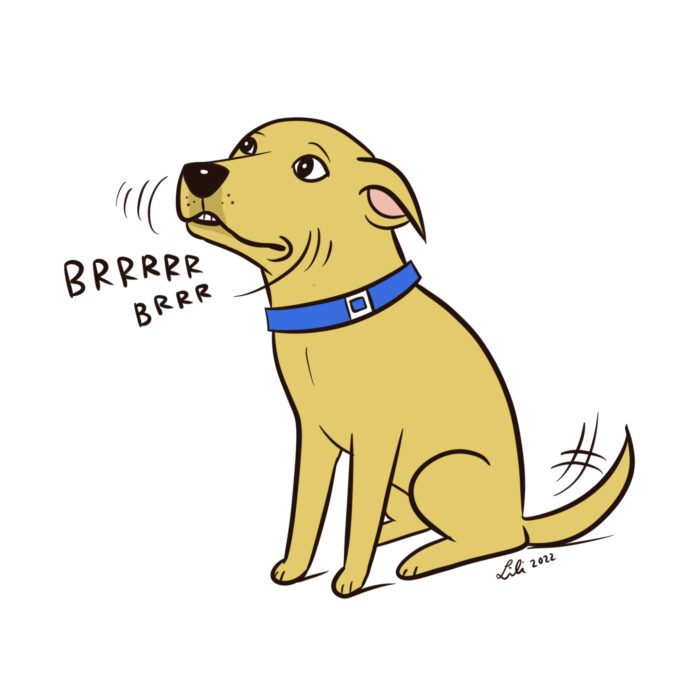
Not all dogs chatter their teeth, and the ones that do tend to do it infrequently and unpredictably, so finding a photograph of a dog chattering away proved impossible for us! Perhaps the most consistent occurrence of the behavior happens (sometimes) when a dog sniffs the urine of another dog. Illustration by Lili Chin, doggiedrawings.net
Not all dogs will chatter their teeth. But among those who do, it can happen for a variety of reasons.
Overstimulation Can Make a Dog’s Teeth Chatter
Some dogs will chatter their teeth out of excitement or anticipation. Think about when your dog is most likely to chatter her teeth. Is it part of her “happy dance” routine as you pick up the leash for a walk or as he happily greets you when you return from work? What about when you’re about to throw a favorite toy or as you prepare a meal?
If any of these scenarios sound familiar, the chattering is likely from excitement and is nothing to worry about. Enjoy it for the endearing quirk that it is.
Your dog might chatter his teeth when he smells something amazing. Has your dog ever chattered his teeth after sniffing the ground where other dogs have been? Dogs rely heavily on scent to navigate the world, and they have highly developed scenting systems. This includes the vomeronasal organ (also known as the Jacobson’s organ), which is located inside the nasal cavity and opens at the roof of the mouth. Chattering his teeth and using his tongue can move scent molecules into the vomeronasal organ where they can be deciphered by your dog. When a dog does this after smelling the urine of another dog, this is known as the “flehman response.”
Again, it’s nothing to worry about.
Cold Can Make a Dog’s Teeth Chatter
Like us, dogs will shiver when cold and this can cause their teeth to chatter. A shiver happens when muscles in the body rapidly contract and relax to create energy to help warm the body. This can include jaw twitches and spasms that make the teeth chatter. Young dogs, elderly dogs, breeds with very little body fat, and toy breeds can have a harder time generating enough heat to maintain proper body temperature in cold conditions.
If your pup’s teeth chatter when the temperature drops, try a well-fitting sweater to keep him comfortable – nobody likes to be cold! (And of course, don’t leave your dog outside unprotected from the elements in inclement weather.)
A Dog’s Teeth May Chatter Due to Health Reasons
Since our dogs can’t tell us what’s bothering them, it’s important that we pay attention to their behavior and body language, as it can often offer clues about how they’re feeling.
Teeth chattering in the absence of an exciting situation, amazing smell, or chilly conditions could be a sign of pain, a dental issue, or a neurological issue, and it’s a good idea to schedule a vet visit to help determine the cause and keep your dog comfortable.





